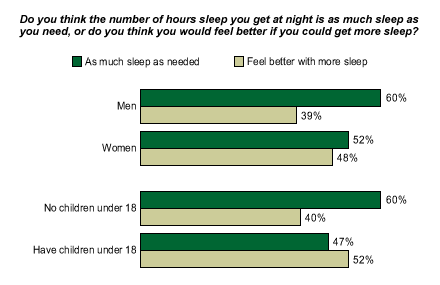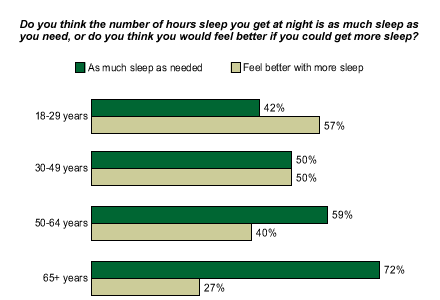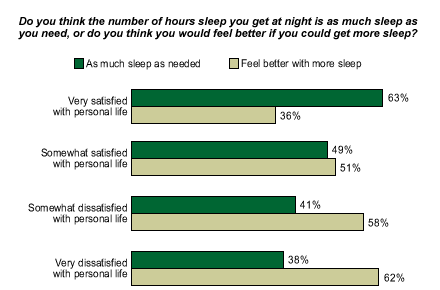Many studies in recent years have trumpeted the importance of a good night's sleep. Some results suggest it's a matter of life and death: A 2003 study in the Annals of Internal Medicine showed women averaging five hours of sleep per night are 39% more likely to develop heart disease than women averaging eight hours per night. And the National Highway Traffic Safety Administration estimates drowsy drivers cause at least 100,000 crashes each year.
The amount of sleep a person needs varies from individual to individual; some people need eight or nine hours a night to function normally, while others may do fine with six. The more useful question is: How many people feel they don't get as much sleep as their bodies need?
According to Gallup's December 2004 Lifestyle poll*, Americans report getting an average of 6.8 hours of sleep per night. Slightly more than half -- 55% -- feel they get as much sleep as they need, while 44% would feel better if they got more sleep. But there is more to the story behind these overall numbers. Aggregated data collected in 2001 and 2004** show that depending on age and family status, some Americans feel more sleep-deprived than others.
Parents, Women Want More Sleep
Parents, who are often saddled with late-night feedings, getting up early to get their children ready for school and themselves to work, and other care-giving responsibilities, yearn for more sleep: 52% of Americans with children under the age of 18 wish they could get more sleep, while only 47% say they already get as much as they need. On the other hand, just 40% of adults without children under 18 say they need more sleep and 60% feel they get enough.

Women are also more likely than men to say they could use more shuteye -- 48% vs. 39%, respectively. Among parents with children under 18, the differences are even more pronounced -- 62% of moms say they would like to get more sleep, compared with only 43% of dads.
Age Differences
The younger Americans are, the more likely they are to yearn for more sleep. Fifty-seven percent of 18- to 29-year-olds feel they need more sleep, as do 50% of 30- to 49-year-olds and 40% of 50- to 64-year-olds. Just 27% of Americans aged 65 and older say they would like to get more sleep. The youngest adults (aged 18 to 29) report getting an average of 6.6 hours of sleep each night, while Americans over 65 get a full 7 hours a night on average.
"We have found that young people, on average, get less sleep and are often afflicted by sleep problems such as trouble falling asleep, a form of insomnia," says Richard L. Gelula, CEO of the National Sleep Foundation. "Their shorter sleep may result from involvement in education, career development, parenting, and lifestyle choices, including more erratic sleep schedules."

Dissatisfaction = Insomnia?
Gallup's data also support the idea anxiety and unhappiness about life are connected to sleep patterns. People who are dissatisfied with the way things are going in their personal lives are far less likely than satisfied people to get enough sleep. Sixty-two percent of Americans who say they are "very dissatisfied" with their personal lives think they need more sleep, compared with just slightly more than a third (36%) of those who are "very satisfied" with their lives.

"Adults typically need a minimum of 7 to 9 hours of sleep in order to be fully alert and at peak performance during their waking hours. Memory, problem solving, behavior, and attitude can all improve with sufficient sleep," says Gelula. "Thus, it is important to make sleep, including regular sleep times, a lifestyle priority."
Bottom Line
The National Sleep Foundation estimates that 40 million Americans suffer from chronic sleep disorders and another 20 million to 30 million have intermittent sleep problems. NSF also reports sleep problems cost Americans more than $100 billion a year in lost productivity, sick leave, medical expenses, and property damage. Many Americans may not view lack of sleep as a serious health problem, but these findings underscore the fact that getting enough sleep is just as important as eating a healthy diet and exercising regularly.
*Results are based on telephone interviews with 1,003 national adults, aged 18 and older, conducted Dec. 5-8, 2004. For results based on the total sample of national adults, one can say with 95% confidence that the margin of sampling error is ±3 percentage points.
**Results are based on telephone interviews with 2,005 national adults, aged 18 and older, conducted Dec. 6-9, 2001, and Dec. 5-8, 2004. For results based on the total sample of national adults, one can say with 95% confidence that the margin of sampling error is ±2 percentage points.